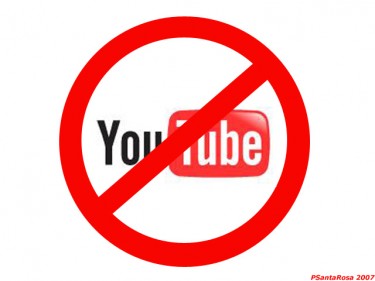On Saturday, February 9, an Egyptian administrative court ordered [1] a 30-day ban on YouTube and all websites linking to content from the anti-Islam film, “The Innocence of Muslims”. The movie sparked public outcry [2] in the Middle East, North Africa and beyond when a trailer for the film was released in 2012. The ruling may not be enforced immediately and it is likely to be appealed.

Image by PSantaRosa on Flickr (CC-by-NC-SA 2.0)
The lawsuit was filed by Mohamed Hamed Salem, an Egyptian lawyer who claimed [3] that the film's anti-Islamic content could “only serve to provoke Muslims and incite sectarian tension and violence.” The suit is one of three against the film that have been filed in Egypt. Another filing (case number 60155 / 66 Q) calls for a complete ban of Google search in Egypt for “threatening national security and peace” by posting the video and recommends the company pay a two billion dollar fine for damages incurred by the film.
When reactions to the film became violent in September of 2012, Google refused to remove the film from Youtube but restricted access to it [4] in Egypt, Libya and Indonesia where it says it violated national law. On 29 January 2013, an Egyptian court sentenced in absentia [5] seven Egyptian Coptic Christians and a Florida-based American pastor to death for participating in making the movie.
Reactions to Saturday's verdict were diverse. Many described [6] the decision as over-zealous and likely to threaten free speech online.
In a statement [7] widely quoted among English language media, human rights lawyer Gamal Eid explained that blocking access to all of YouTube would threaten the right to free expression in Egypt. He suggested that the government appeal the case and argue that, at most, only specific pages on websites should be blocked.
One commenter [8]writing on Slashdot.org speculates about the real motives behind the ban (all videos linked to in this comment are graphic and violent in nature. Reader discretion is advised):
They are blocking it because they are ashamed of the police abuse caught on videos. The ‘Innocence of Muslims’ video is excuse they are using to hide.
Here's the real thing they want to hide from:
Man being dragged, beaten, and stripped of clothes – http://youtu.be/AlgUUGKZ4R4
Man in wheel chair shot by police – http://youtu.be/WAOkfxibwr0
Police use live ammunition and shoot randomly in the city of Tanta – http://www.youtube.com/watch?v=k27pETl46qg
The economic impact of a YouTube ban worries many Egyptian observers. On Wamda [9], Nina Curley argued that the ban could be counterproductive, both economically and politically:
Should the Telecom and ICT ministries in Egypt proceed to enact the ban, thwarting investment in small businesses, which can critically help create jobs and get the economy back on its feet, it would seem counterproductive. And when has restriction in Egypt lately led to silence and acceptance?
Last November, an order banning all pornographic websites [10] in Egypt was issued but never materialized. Officials cited [11] technical difficulties and high costs associated with the blocking. They favored a decentralized policy that would allow users to do the blocking themselves.
In an interview with The Guardian [6], Egyptian Initiative for Personal Rights Director Amr Gharbeia said,
The courts are not aware of how the internet works. They are using the same measures that they would use against newspapers and broadcasters.
Gharbeia suggested that users would likely find a way around the ban.